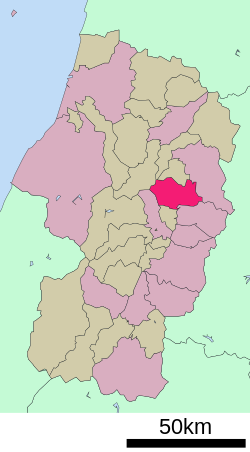Murayama, Yamagata
|
Murayama 村山市 |
|||
|---|---|---|---|
| City | |||

Murayama City Hall
|
|||
|
|||
 Location of Murayama in Yamagata Prefecture |
|||
| Coordinates: 38°29′N 140°23′E / 38.483°N 140.383°ECoordinates: 38°29′N 140°23′E / 38.483°N 140.383°E | |||
| Country | Japan | ||
| Region | Tōhoku | ||
| Prefecture | Yamagata | ||
| Area | |||
| • Total | 196.98 km2 (76.05 sq mi) | ||
| Population (October 2015) | |||
| • Total | 24,703 | ||
| • Density | 125/km2 (320/sq mi) | ||
| Time zone | Japan Standard Time (UTC+9) | ||
| - Tree | Japanese Red Pine | ||
| - Flower | Rose | ||
| Phone number | 0237-55-2111 | ||
| Address | 1-3-6 Chūō, Murayama-shi, Yamagata-ken 995-8666 | ||
| Website | Official website | ||
Murayama (村山市 Murayama-shi?) is a city located in Yamagata Prefecture, in the Tohoku region of northern Japan.
As of October 2015, the city had an estimated population of 24,703 and a population density of 125 persons per km². The total area was 196.98 square kilometres (76 sq mi).
Murayama is located in northeast Yamagata Prefecture, in a river valley of the Mogami River, with branches of the Ōu Mountains to the east and west.
Murayama has a Humid continental climate (Köppen climate classification Dfa) with large seasonal temperature differences, with warm to hot (and often humid) summers and cold (sometimes severely cold) winters. Precipitation is significant throughout the year, but is heaviest from August to October.
The area of present-day Murayama was part of ancient Dewa Province. After the start of the Meiji period, the area became part of Kitamurayama District, Yamagata Prefecture. The modern town of Murayama was established on April 1, 1954.
The economy of Murayama is based on agriculture.
Murayama has eight elementary schools, two middle schools and two high schools.
...
Wikipedia



